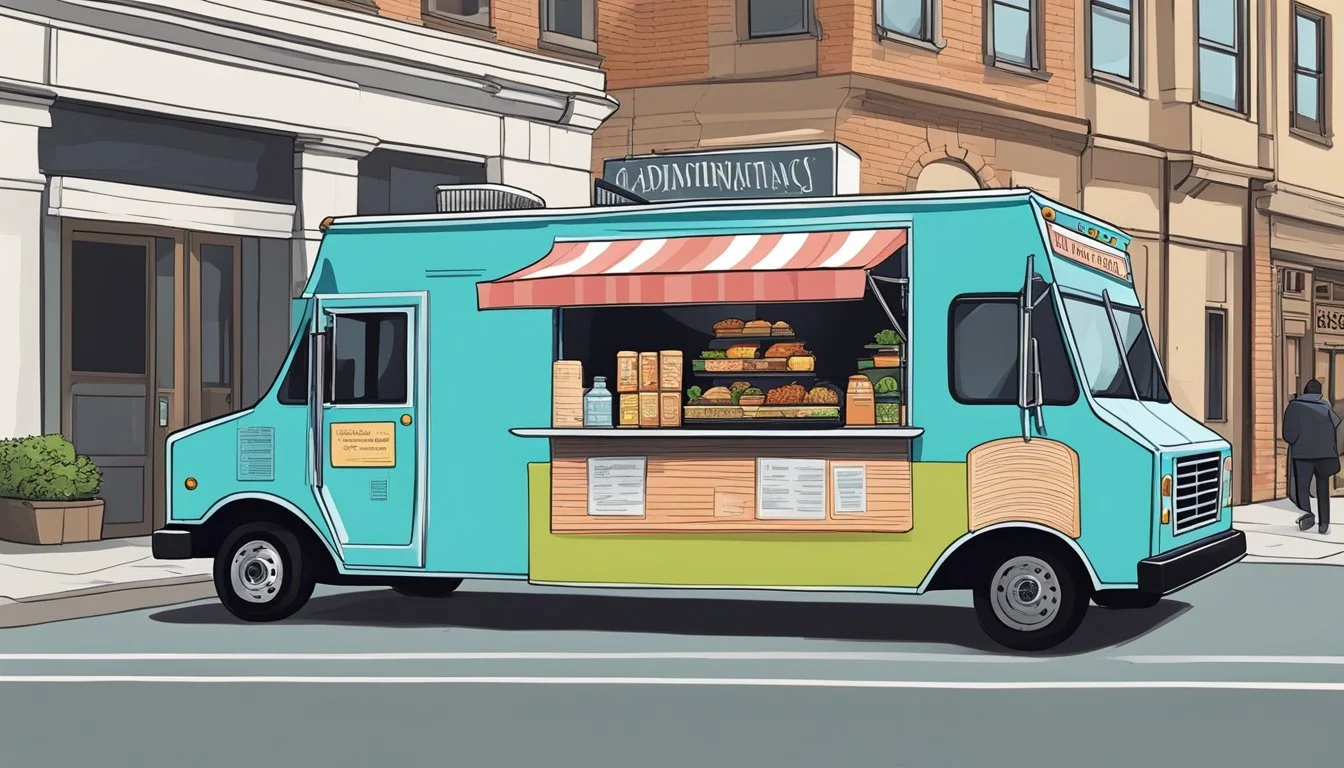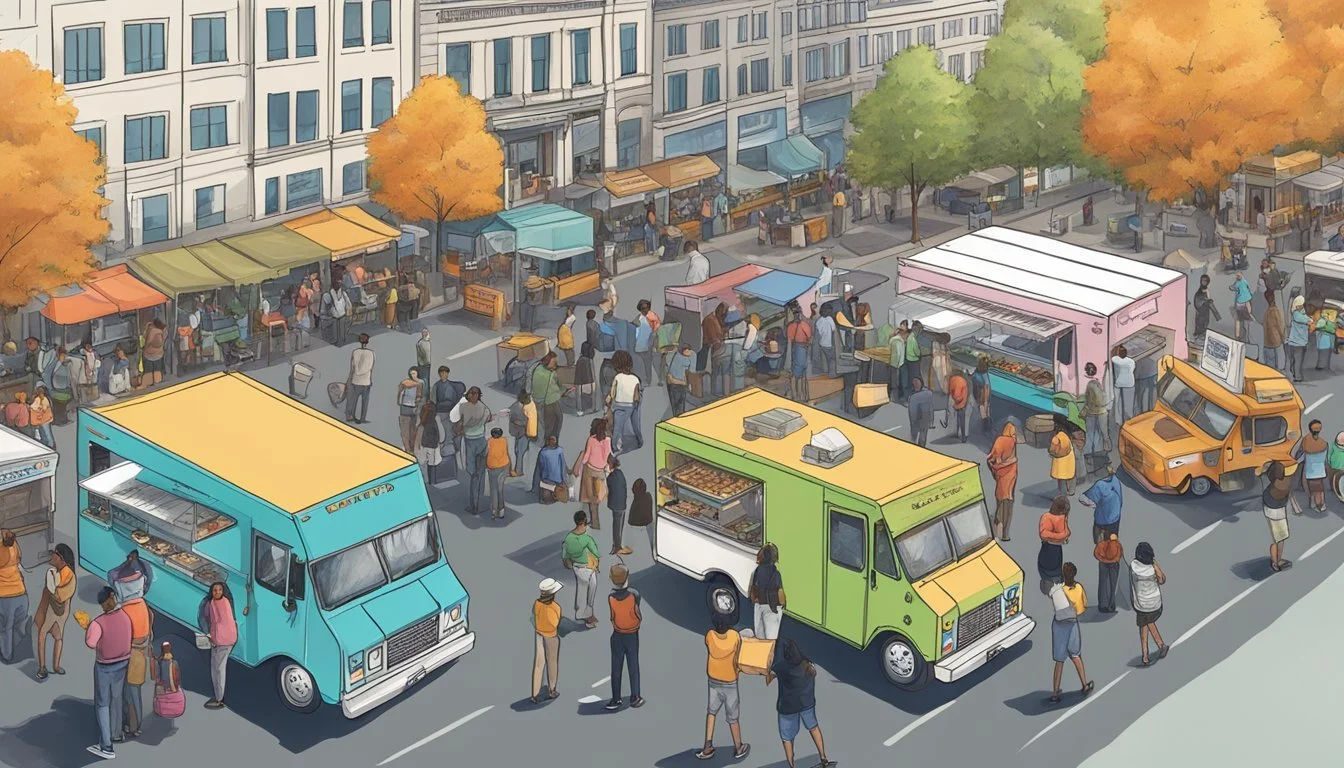Food Truck Laws Washington, District of Columbia
Navigating Regulations for Mobile Vendors
Starting and operating a food truck in Washington, DC, is bound by a comprehensive framework of laws and regulations designed to safeguard public health and ensure orderly conduct. As mobile eateries serving a rich variety of cuisines have burgeoned throughout the capital, these laws have become a critical facet for both current and aspiring food truck operators. It is compulsory for all mobile food vendors to adhere to regulations such as Title 25-A of the District of Columbia Municipal Regulations.
These regulations detail important elements like obtaining the necessary permits, sanitation standards, food safety requirements, and the permissible locations and hours of operation. One of the key stipulations mandates that food trucks undergo health inspections every six months. Such inspections are crucial to maintaining compliance with the District of Columbia Food Code Regulations. Those who wish to initiate a food truck business must navigate these legalities to obtain a Vending Health Certificate, which is valid for six months.
In addition to health and safety regulations, food truck operators in Washington, DC, must navigate various licensing procedures. The Department of Licensing and Consumer Protection provides resources for vendors, encompassing both the application process for a vending license and the enforcement of vending laws. Compliance with these rules plays a significant role in the sustainable integration of food trucks into the city’s vibrant culinary scene.
Understanding Food Truck Laws in D.C.
Navigating the web of food truck regulations in the District of Columbia is essential for vendors to operate legally and safely. This section lays out the current laws, health oversight, and recent legislative changes, and it also contrasts food truck operations with those of traditional brick-and-mortar restaurants.
Overview of District of Columbia Food Truck Regulations
The District of Columbia maintains a comprehensive set of regulations for food trucks to ensure public health and safety. Vendors are required to secure proper licensing, which includes adherence to specific parking, vending location, and operating time requirements. The legislation also stipulates that food trucks must not obstruct pedestrian traffic and comply with the city's environmental standards.
Role of DC Health in Food Truck Regulation
DC Health plays a pivotal role in monitoring food trucks to uphold health and safety standards. They conduct inspections to ensure that food trucks follow food safety regulations, similar to those for brick-and-mortar establishments. Food truck operators must pass these inspections to obtain a Mobile Roadway Vending license from the District.
Recent Changes and New Food Truck Regulations
Under the guidance of the council and leadership such as Mayor Vincent Gray, new food truck regulations have periodically been enacted, including designated vending zones known as Mobile Roadway Vending zones. These areas allow food trucks to operate without the worry of parking-meter restrictions during peak hours.
Comparing Food Truck Laws with Brick-and-Mortar Restaurants
While food trucks and restaurants are both subject to similar health and safety inspections, food trucks face unique regulations related to mobility. For instance, they must adhere to specific laws governing parking and proximity to existing restaurants, which do not apply to fixed-location restaurants.
Licensing and Permit Requirements
Operating a food truck in Washington, D.C., requires adherence to specific licensing and permitting procedures to ensure compliance with health and safety regulations.
Step-by-Step Process for Obtaining a Food Truck Permit
Determine Eligibility: Ensure that the food truck meets the District of Columbia Municipal Regulations for mobile food vending.
Online Application Submission: Complete the necessary forms and submit them via the Digital Health Compliance (DHC) system, an online platform for food safety regulations compliance.
Inspection Appointment: Schedule an inspection of the vending unit with the Department of Health.
Approval and Fee Payment: Upon passing the inspection, pay the required fees to obtain the permit.
Types of Permits and Vending Units
Mobile Food Facility Permit: Required for all mobile food vendors operating in the city.
Vending Units: Include food trucks, carts, and kiosks, each subject to specific guidelines set forth by the Division of Food.
The Lottery System for Food Truck Locations in D.C.
Location Assignment: Participate in the lottery system managed by the District's Department of Consumer and Regulatory Affairs (DCRA) for assignment to designated public spaces.
Vendor Selection: Vendors are selected and allotted spaces based on the results of the lottery, thereby regulating mobile food vending traffic throughout the city.
Regulatory Bodies and Enforcement
In Washington, D.C., the food truck industry is regulated by several entities, ensuring that all operations meet the established health, safety, and logistical standards. The regulatory process is designed to maintain consumer choice and public space integrity.
Department of Consumer and Regulatory Affairs (DCRA)
DCRA is the primary regulatory body responsible for overseeing food truck operations in the District. It enforces Title 24 of the District of Columbia Municipal Regulations, which details the requirements for food and food operations. Food trucks must obtain proper licensing and pass inspections to comply with food safety regulations. The Food Safety Regulations administered by DCRA ensure the health and safety of consumers.
Compliance with District Department of Transportation Regulations
The District Department of Transportation (DDOT) governs the use of public space by food trucks. Compliance with DDOT regulations is mandatory for food truck operators to avoid fines and ensure they are vending in the appropriately designated zones. Adherence to vending locations and times is critical to maintain order and prevent disruptions in the public right-of-way. Information on specific DDOT guidelines can be found in the Mobile Food Vending section of the DC Health website.
How to File a Complaint About Food Truck Operations
Should there be a need to address concerns regarding food truck operations, individuals can file a complaint through the proper channels. The process involves contacting the DCRA for health and safety issues or the DDOT for issues related to public space usage and compliance. Enforcement is taken seriously to protect consumers and ensure fair consumer choice. To file a complaint, stakeholders can follow the outlined procedures available on the DCRA or DDOT websites to report any non-compliant food truck activities.
The coordination among the regulatory bodies like DCRA and DDOT and the enforcement mechanisms set in place upholds the standards for all stakeholders involved in the food truck business within the nation's capital.
Ancillary Food Business Considerations
In Washington, D.C., food businesses operating outside of traditional brick-and-mortar establishments face specific legislative challenges. They must navigate regulations that prioritize health and safety while also taking advantage of certain concessions, such as those provided to cottage food operations.
Cottage Food Business Regulation
Cottage Food Businesses in Washington, D.C., are empowered by regulations that allow for the production and sale of non-potentially hazardous foods from a home kitchen. It is imperative to adhere to the District of Columbia Municipal Regulations to ensure the health and safety of consumers. Operators must secure a Cottage Food Business License and comply with proper labeling and processing standards to prevent foodborne illnesses.
Solicitors and Sidewalk Vendors
Solicitors and sidewalk vendors are integral to the diverse urban tapestry of Washington, D.C. They are required to follow the Vending Regulations which outline where and when they can operate. This includes the compliance with the specified Mobile Roadway Vending zones, crafted to streamline the operation of food trucks and other mobile vendors without the encumbrance of restrictive parking-meter time limits.
Cottage Food Businesses and solicitors must understand and respect these frameworks to ensure both the growth of their enterprises and the wellbeing of their customers.
Administrative Details and Contacts
Successful operation of a food truck in Washington, D.C. requires navigating a series of administrative procedures. The following details provide essential contact information and operational hours for the city’s food truck vendors, ensuring compliance with local regulations.
D.C. Processing Center Address and Office Hours
The primary Processing Center for mobile food vending is located at:
Office of the Chief Financial Officer
1101 4th Street, SW,
Washington, D.C., 20024Office Hours:
Monday to Friday: 8:30 AM - 4:30 PM
Saturday and Sunday: Closed
Vendors are advised to handle administrative tasks during these hours to ensure adherence to city requirements for food truck operations.
Emergency Contact Information and Email Inquiries
In case of emergencies, food truck operators can contact the Fire Protection Division to comply with safety regulations involving propane and other hazards:
Fire Protection Division
1100 4th St. SW #700,
Washington, D.C., 20024
(202) 727-1614For email inquiries, the D.C. Department of Health provides a direct channel for resolving any questions or concerns through the following email address:
Email: doh@dc.gov
Food vendors should use this contact for official communications related to food safety and vending regulations in the District of Columbia.
Events, Community Engagement, and Advocacy
In Washington D.C., the dynamic food truck scene is bolstered by clear laws and active associations that facilitate events, engage the community, and advocate for vendors and consumers alike. The success of the food truck industry in the capital hinges on navigating permit requirements for special events, leveraging the support of the DC Food Truck Association (DCFTA), and fostering strong relationships with businesses and individuals.
Permit Requirements for Special Events
Special events in Washington D.C. often feature food trucks, offering a diverse range of culinary options to attendees. To participate, food truck operators must comply with specific permit requirements. These regulations ensure food safety and fair competition while allowing consumers to enjoy a wide variety of dining choices. The permit process typically involves health inspections and adherence to parking regulations, which vary depending on the event size and location.
Mission and Activities of the DC Food Truck Association (DCFTA)
The DC Food Truck Association (DCFTA) plays a crucial role in uniting the community of mobile food vendors. With a clear mission to protect and promote the interests of its members, the DCFTA offers resources, advocacy, and representation. The association actively works to shape policies that impact the food truck industry and aims to maintain a balance between regulatory needs and the entrepreneurial spirit of its members.
Building Relationships with Local Businesses and Consumers
For food truck operators in Washington D.C., community engagement is key. By building relationships with local businesses and consumers, food trucks create consumer choice and enhance the vibrancy of the community. Participating in local events and fostering partnerships with commercial establishments lead to mutual benefits, including increased foot traffic and a shared customer base. Maintaining a neutral and informative stance, food trucks contribute to the city’s cultural fabric and economic diversity.
Operational Strategies for Food Truck Owners
Food truck owners in Washington, D.C. must employ strategic planning to navigate the robust marketplace and regulatory environment. Ensuring successful operations often hinges on location choice, response to competition, and staying abreast of legal changes.
Maximizing Lunch Hour and Business Location Strategy
Effective placement during lunch hour can significantly impact a food truck's profitability. Owners should target high-foot-traffic areas near offices and public spaces to capitalize on the peak dining period. Locations designated as Mobile Roadway Vending zones allow for operation without worrying about parking-meter time limits, enhancing the chance of capturing steady lunchtime business.
Adapting to Competition and Consumer Trends
Competition among food trucks in the capital is fierce. An operator's ability to adapt menus and services to align with prevailing consumer choice can provide an edge. Tracking trends in real-time through social media and customer feedback leads to informed decisions about menu adjustments, special promotions, and collaborations with other local businesses.
Engaging with Proposed Regulations and Legal Updates
Proactive engagement with new legislation and proposed regulations is crucial for food truck owners. They should maintain a regular dialogue with the Council to anticipate changes affecting operations in public spaces. Awareness of recent attempts to update food truck regulations enables owners to adjust strategies quickly and remain compliant with D.C.'s vending laws.







